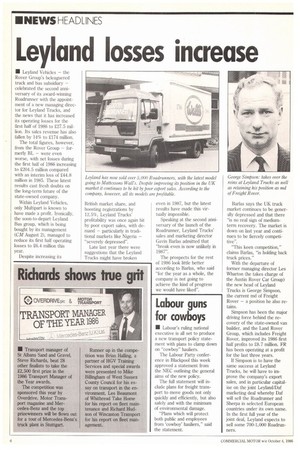Leyland losses increase
Page 8

If you've noticed an error in this article please click here to report it so we can fix it.
• Leyland Vehicles — the Rover Group's beleaguered truck and bus subsidiary — celebrated the second anniversary of its award-winning Roadrunner with the appointment of a new managing director for Leyland Trucks, and the news that it has increased its operating losses for the first half of 1986 to 227.5 million. Its sales revenue has also fallen by 14% to 2174 million.
The total figures, however, from the Rover Group — formerly BL — were even worse, with net losses during the first half of 1986 increasing to £204.5 million compared with an interim loss of £44.8 million in 1985. These latest results cast fresh doubts on the long-term future of the state-owned company.
Within Leyland Vehicles, only Multipart is known to have made a profit. Ironically, the soon-to-depart Leyland Bus group, which is being bought by its management (CM August 2), managed to reduce its first half operating losses to £6.4 million this year.
Despite increasing its British market share, and boosting registrations by 12.5%, Leyland Trucks' profitability was once again hit by poor export sales, with demand — particularly in traditional markets like Nigeria — "severely depressed".
Late last year there were suggestions that the Leyland Trucks might have broken even in 1987, but the latest results have made this virtually impossible.
Speaking at the second anniversary of the launch of the Roadrunner, Leyland Trucks' sales and marketing director Gavin Barlas admitted that "break even is now unlikely in 1987".
The prospects for the rest of 1986 look little better according to Barlas, who said "for the year as a whole, the company is not going to achieve the kind of progress we would have liked". Barlas says the UK truck market continues to be generally depressed and that there "is no real sign of mediumterm recovery. The market is down on last year and continues to be fiercely competitive".
"This keen competition," claims Barlas, "is holding back truck prices."
With the departure of former managing director Les Wharton (he takes charge of the Austin Rover Car Group) the new head of Leyland Trucks is George Simpson, the current md of Freight Rover — a position he also retains.
Simpson has been the major driving force behind the recovery of the state-owned van builder, and the Land Rover Group, which includes Freight Rover, improved its 1986 first half profits to £8.7 million. FR has been operating at a profit for the last three years.
If Simpson is to have the same success at Leyland Trucks, he will have to improve the company's export sales, and in particular capitalise on the joint LeylandiDaf marketing deal whereby Daf will sell the Roadrunner and Sherpa in selected European countries under its own name. In the first full year of the joint deal, Leyland expects to sell some 700-1,000 Roadrunners.








































































































































